
Nepal is a multi-ethnic, multiracial, multicultural, multi-religious, and multilingual country. The most spoken language is Nepali followed by several other ethnic languages.
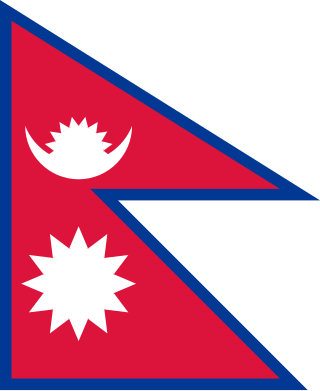
Nepal, officially the Federal Democratic Republic of Nepal, is a landlocked country in South Asia. It is mainly situated in the Himalayas, but also includes parts of the Indo-Gangetic Plain. It borders the Tibet Autonomous Region of China to the north, and India in the south, east, and west, while it is narrowly separated from Bangladesh by the Siliguri Corridor, and from Bhutan by the Indian state of Sikkim. Nepal has a diverse geography, including fertile plains, subalpine forested hills, and eight of the world's ten tallest mountains, including Mount Everest, the highest point on Earth. Kathmandu is the nation's capital and the largest city. Nepal is a multi-ethnic, multi-lingual, multi-religious and multi-cultural state, with Nepali as the official language.
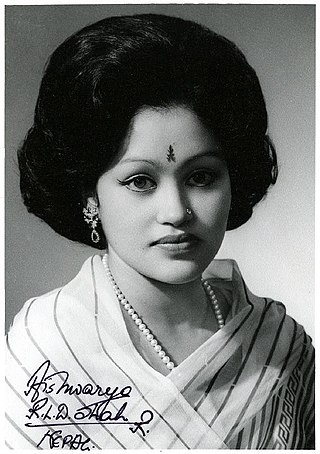
Aishwarya Rajya Lakshmi Devi Shah was the Queen of Nepal from 1972 to 2001, also referred to as Bada Maharani (बडामहारानी). She was the wife of King Birendra and the mother of King Dipendra, Prince Nirajan, and Princess Shruti. She was the eldest among the three daughters of the late General Kendra Shumsher Jang Bahadur Rana and Shree Rajya Lakshmi Devi Shah in Lazimpat Durbar, Lazimpat, Kathmandu.

Bhimsen Thapa was a Nepalese statesman who served as the Mukhtiyar and de facto ruler of Nepal from 1806 to 1837. He is widely known as the longest-serving prime minister of Nepal and was inducted into the "National heroes of Nepal" by King Mahendra Bir Bikram Shah.

The Prime Minister of Nepal is the head of government of Nepal. Together with their Council of Ministers, the prime minister exercises executive power in the country.
Nepalese literature is the literature of Nepal. This is distinct from Nepali literature, which is the literature in only Nepali language. The major literary languages of Nepal are:

Manjushree Thapa is a Nepalese–born Canadian essayist, fiction writer, translator and editor. She is one of the first English writer of Nepali descent to be published internationally. Forget Kathmandu and The Tutor of History are some of her most well known works.
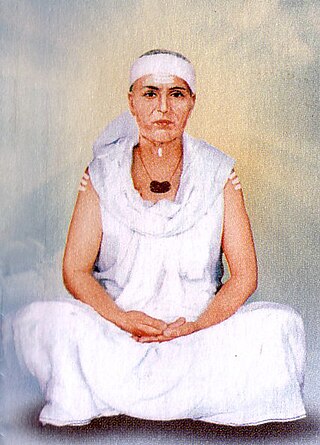
Yogmaya Neupane (1867–1941) was a religious leader, women's rights activist and poet based in Bhojpur district of Nepal. Yogmaya is considered to be among the pioneer female poets in Nepal with her only published book of poems, the Sarwartha Yogbani considered to be her most notable contribution.

Arzu Rana Deuba is a Nepali social worker, psychologist and politician, currently serving as a Member of Parliament (MP) representing the Nepali Congress Party of Nepal. She had joined the NC in 1996 and was elected Central Committee member of the party since December 2021. In the 2022 Nepalese general election she was elected as a proportional representative from the Khas people category. She is the wife of former PM Sher Bahadur Deuba.
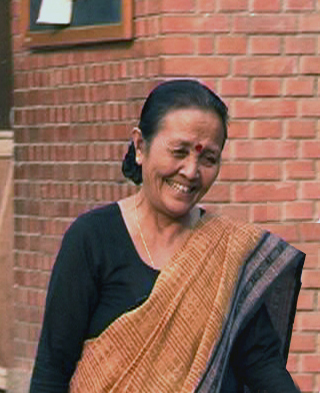
Anuradha Koirala, Okaldhunga district, is a Nepalese social activist and the founder of Maiti Nepal – a non-profit organization in Nepal, dedicated to helping victims of sex trafficking. She was appointed as 1st Governor of Bagmati Province from by the Government of Nepal.

Dharma Ratna Tuladhar, popularly known as Dharma Ratna Yami was a Nepalese government deputy minister, activist and Newa language writer

Rekha Thapa is a Nepalese film actress. She is considered one of the most successful actresses in Nepali cinema. She was a top ten finalist for Miss Nepal in the year 1999. She made her film debut two years later in Chhabiraj Ojha's Hero. She has appeared in approximately 200 Nepali films and rose to prominence in the Nepali film industry due to her glamorous role, which was novel to the traditional audience. She won the CG Digital Film Awards for Best Actress, and in 2011 she also won the NEFTA Film Awards for Best Actress.

Bageshwori Temple is one of the most important Hindu temples in Nepal. It is at the center of Nepalgunj, the biggest city in mid-western development region, now in Lumbini province after restructuring of Nepal in federalism. It is dedicated to goddess Bageshwori- Durga. The temple area also houses another famous temple- the temple of Shiva with mustache, which is one of the only two such temples in the country.

Toya Gurung is a Nepali writer and poet. She served as the first female executive member of the Royal Nepal Academy. She headed the poetry department of Nepal Academy from 1994 to 2004. She has published multiple poetry collections such as Dhopee and Toya Gurungka Lama Kavita and a short story collection called Kusum. He poems have also been translated in Hindi and English.
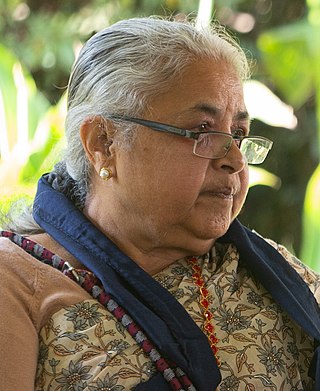
Sushila Karki is a Nepalese jurist. She is the former Chief Justice of the Supreme Court of Nepal and the only woman to have held the post. Karki became Chief Justice on 11 July 2016. The Constitutional Council headed by the Prime Minister KP Oli recommended her for the post.

Dhruba Chandra Gautam is a Nepalese novel writer. He has authored over 60 stories and novels, most of which address contemporary social issues. He is known as Akhyan Purush(towering personality) in Nepali literary circle.

Sharada Sharma is a Nepali writer and poet. Her debut novel, Taap, won the 2012 Padmashree Sahitya Samman award.

Hiranya Garbha Kumari Devi was a Nepalese maharani and principal wife of Jung Bahadur Rana.
Bhuwan Dhungana is a Nepali writer and poet. She is best known for her short story The Thousand Rupee Note which has also been translated into English and Urdu. Her first novel Parityakta was published in 2020.

Shanti Mishra was a Nepali lecturer, librarian, writer and translator. She was the first Nepali female full-time lecturer and first Nepali female librarian. She was the first female librarian of Tribhuvan University Central Library. She also served as the founding director of PEN chapter of Nepal.


















